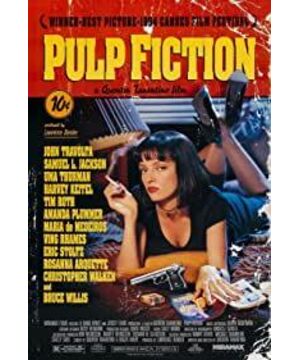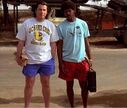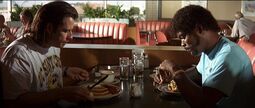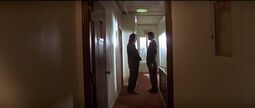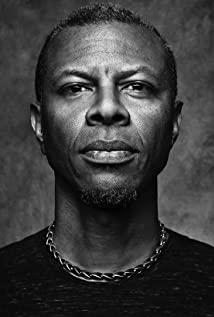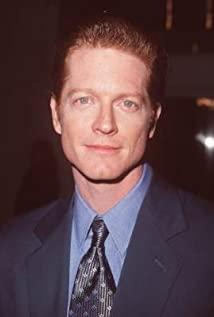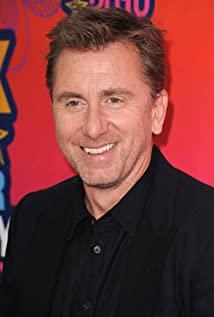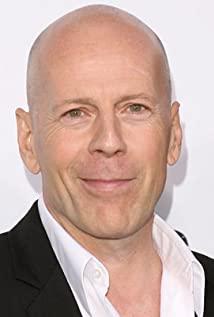Some people call 1994 "the year when God wants to watch movies." Excellent films such as "Forrest Gump", "Shawshank's Redemption", "True Lies" and so on have spurted out. That year, Quentin's "Pulp Fiction" defeated Kieslowski's "Red" and won the Palme d'Or at the 47th Cannes International Film Festival. As an attempt of postmodern film, its victory is undoubtedly of epoch-making significance.
On May 22, "Once Upon a Time in Hollywood" premiered at the Cannes Film Festival, director Quentin Tarantino led Leonardo DiCaprio, Brad Pitt, Dakota Fanning Appearance with Margot Robbie , set off the climax of the film festival.
Most people know Quentin from his second directorial work "Pulp Fiction" .
The first time I watched "Pulp Fiction", four words jumped in my mind: fragmented .
If we sort out the narrative context of "Pulp Fiction" in a linear sequence of development, the film actually only tells a long and vulgar story. Quentin broke the linear structure and recomposed the narrative sequence.
The film opens with a man and a woman robbing a fast food restaurant. After the opening song ends, the camera turns to the story of Vincent and Jules murdering people.
The subtitles VINCENT VEGA & MARSELLUS WALLACE'S WIFE appeared.
The camera turns to the boss making a boxing deal with Butch. Vincent receives a new task to accompany the boss's wife Mia. After having dinner together, Vincent successfully rescued Mia who had taken the wrong medicine, and the two said goodbye.
At this time, the screen turned black, the accompanying dog barked, and the camera turned to Butch. He recalled the heirloom gold watch and absconded. When he went home to pick up the gold watch, he killed Vincent, strayed into the black shop with the boss, rescued the boss, and the two reconciled.
The subtitle "THE BONNIE SITUATION" appeared, and the scene suddenly returned to the scene of Vincent and Jules getting dirty. Jules decided to wash his hands in the golden basin because of the "miracle". He was robbed by the male and female robbers at the fast food restaurant, and finally solved it in a bloodless manner. event.
This kind of jumping combination reminds me of Wong Kar-wai and Faulkner. They all use seemingly broken plots, tightly grasping the nerves of the audience and readers, and constantly teasing the current and hidden curiosity, and then giving a powerful impact in an instant. For example, Vincent, who died in the previous episode, suddenly appeared alive in the next episode.
Although the narrative jumps, the beginning and the end of the story are cleverly spliced together, forming a clever ring-shaped complementary structure through the restaurant. Every plot of the story has a foreshadowing. It can be said that behind the seemingly unconstrained narrative, there is a subtle design.
For example, in the first scene, behind the woman in the restaurant, Vincent goes to the bathroom.
I prefer to regard "Pulp Fiction" as a movie without a protagonist. In my opinion, this movie tells us a cruel fact that everyone may be the protagonist or a supporting role who will "get a box lunch" at any time.
The robbers at the beginning of the film seem to be chic and wise, in control of the restaurant's overall situation, but at the end of the film they become Jules's subordinates. In Vincent's previous story, he was still a handsome man who could have dinner with the boss's woman and had a secret affection. In the next story, he died under Butch's gun in just one second.
The boundaries between black and white and good and evil are dismantled. The typical heroes and villains in the typical environment are replaced by mortals in the secular world. Everyone is experiencing their own inner struggle.
Is "Pulp Fiction" really "vulgar"?
It is full of violence, bloodshed, drugs, sex. But it is this kind of "vulgarity" that expresses the most real life we don't want to admit. Accidents and violence are everywhere. Reason and lust, pain and happiness, seriousness and joking, profound and superficial, tear us and shape us.
Quentin is playing with "Pulp Fiction" as life is playing with us.
The meaning of life is a theme that has been continuously explored in literature and movies for thousands of years. In Quentin's film world, life no longer needs to pursue a meaning. This is how we live, that's all. Our life is nothing but a black humor with a bleak background, a vulgar novel that does not require elegance.
Author: Bar
Welcome to pay attention to the public account "Leave the Book" paokaisb
View more about Pulp Fiction reviews


